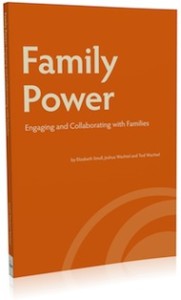 "Nothing about me without me." —Children and families involved in the FGC/FGDM process.
"Nothing about me without me." —Children and families involved in the FGC/FGDM process.
This new book, published by the IIRP, was written by Beth Smull, Joshua Wachtel and Ted Wachtel
Waves of change have weakened the influence of family in modern societies, yet family remains the most critical element in our social fabric. A new approach for working with families--"family group conferencing" (FGC) or "family group decision making" (FGDM)--seeks to strengthen this fabric by enlisting the collective power of families and their communities of care to address their own issues and solve their own problems. This paradigm has implications for myriad professionals, including social workers, police, court personnel, therapists, youth workers, day-care staff and educators.
The book provides a step-by-step guide for engaging and collaborating with families, illustrated by stories gathered from around the world. The authors also connect FGC/FGDM with the broader field of restorative practices, which holds that "people are happier, more cooperative and productive, and more likely to make positive changes when those in positions of authority do things with them, rather than to them or for them."
"I do not believe that professionals can give power to families. Rather, families will take power and become 'power-full' when professionals create the right conditions for this to occur." --Mike Doolan, former Chief Social Worker of New Zealand
Family Power Topics Include:
- The origins of FGC/FGDM
- The role of the FGC/FGDM conference coordinator
- Conference preparation, facilitation and follow-up
- Family engagement practices beyond the formal FGC/FGDM process
